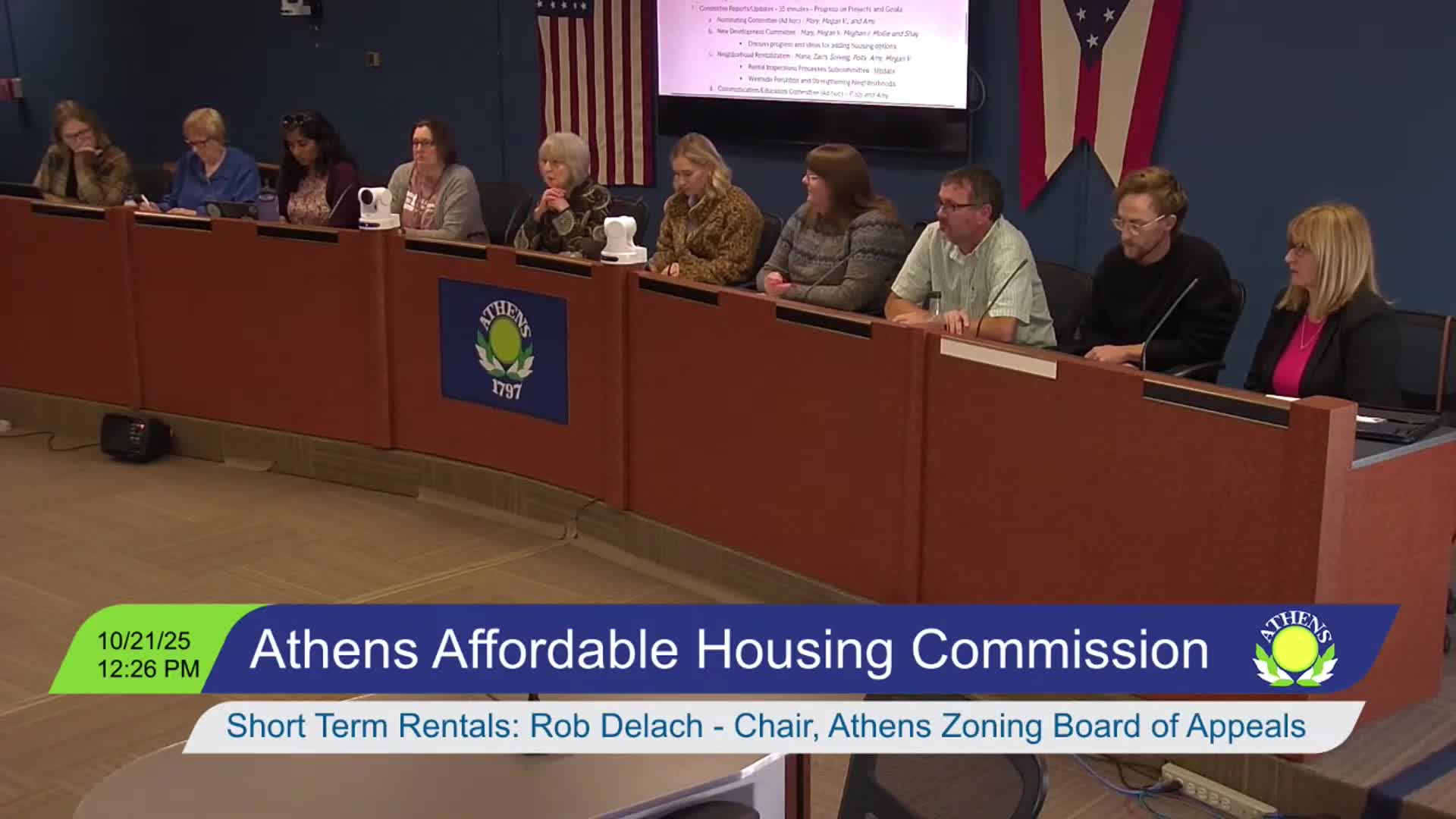Athens BZA report: 33 permitted short-term rentals so far; board says code largely working
Get AI-powered insights, summaries, and transcripts
Subscribe
Summary
The Board of Zoning Appeals and city staff told the Athens City Affordable Housing Commission that 33 short-term rental permits exist in the city as of October, most owner-occupied in R-1 zones; the BZA said it has denied non-owner-occupied requests so far and raised watchpoints for conversions in business and R-2/R-3 zones.
Rob Delich, chair of the Board of Zoning Appeals, told the Athens City Affordable Housing Commission on Oct. 21 that the city has 33 permitted short-term rentals and that most are owner-occupied rooms in single-family homes.
Delich said short-term rentals “is a dwelling unit offered for rent in part or in its entirety for less than 30 consecutive days per occupant,” and that the current permits reflect that intent. He said two accessory dwelling units (ADUs) are permitted as short-term rentals and that about 17 of the permitted listings are in R-1 (single-family) zones. Delich told commissioners the city’s permitted short-term rental stock includes about 11 whole-unit house short-term rentals in business zones, totaling roughly 17 units, and roughly 14 locations (23 units) that appear to have been converted from long-term to short-term use.
The BZA chair said those conversions represent a small share of the local rental market. “With over 5,000 rental units…that’s 1.4%,” he said, referencing a 5,555-unit baseline from 2021 and his own estimate of removals. Delich added that the permit issuance rate has been steady—not accelerating—since the city adopted the code changes that created a permitting system.
Delich and Megan Jennings, Athens city planner, described how the zoning code’s hierarchy affects where non-owner-occupied short-term rentals can be established. Delich and Jennings said R-1 remains the most restrictive category; conditional uses or variances in R-1 are reviewed by the BZA. Their explanation emphasized that R-2/R-3 and certain business zones can allow short-term rentals under existing code language in ways that could make conversions easier unless the city chooses targeted changes.
Both Delich and Jennings flagged a specific local concern: several legally nonconforming residential units inside business zones and a handful of townhome developments could be vulnerable to purchase-and-convert activity. Delich said one local owner purchased multiple properties in recent years and converted them to short-term rentals, calling that a “red flag” to monitor.
Delich said the BZA has required local property managers for owners who live more than 50 miles away and that the board has imposed similar stipulations during conditional-use hearings. He said the BZA has not approved a non-owner-occupied short-term rental in R-1 to date, and panel members are weighing community impacts and “no detriment” criteria when they rule.
Commissioners raised questions about enforcement and market monitoring. Delich said the code office previously contracted for periodic market scans of listings platforms but discontinued the service for budget reasons; he suggested interns or a zoning intern could assist monitoring.
No formal policy change was adopted at the commission meeting. Commissioners asked staff to clarify how R-2 and certain business-zone provisions are currently written and to provide greater detail about enforcement practice.
The BZA and planning staff recommended continued monitoring and targeted code adjustments as an option, particularly to limit non-owner-occupied whole-unit conversions in business and multifamily zones.
